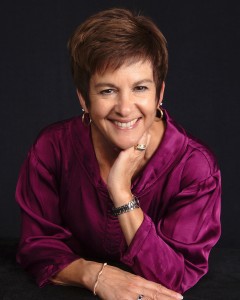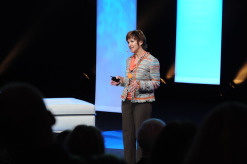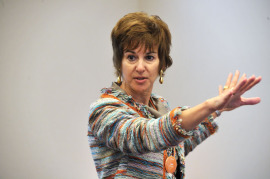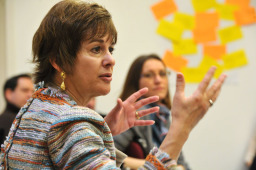KEYNOTES BY DR. JAN FERRI-REED
For over 24 years, Jan, a seasoned consultant and President of KEYGroup, has worked with leaders to create cool workplaces that attract, retain, and get the most from their talent. Her expertise, insight, wisdom, humor, and practical solutions have made Jan a highly sought-after speaker for keynote addresses, seminars, conferences, and workshops. She has brought fresh concepts and effective techniques to executives and audiences around the globe.
Among the organizations that have engaged Jan to deliver speeches, develop custom presentations, and provide consulting services are: GlaxoSmithKline, Pitney Bowes, PPG Industries, Inc., U.S. Steel Corporation, SAE International, American Society of Association Executives, Transformer Association, The Minerals, Metals & Materials Society, National Association of Graphic and Product Identification Manufacturers, Inc., Bristol Myers Squibb, Bayer, Mitsubishi Electric Power Products, and MTV Networks.
Jan is the co-author of the published book with Dr. Joanne G. Sujansky for John Wiley Publications, Keeping the Millennials: Why Companies are Losing Billions in Turnover to This Generation and What to Do About It and author of Millennials 2.0: Empowering Generation Y. These books explains how Millennials are costing corporations around the globe billions in unnecessary, preventable turnover and provides a proven approach for creating a corporate culture that keeps them on the job and working productively.
Jan has been called upon by numerous media sources to provide guidance on leadership practices and productive workplace cultures and is an active member of the American Society for Training and Development (ASTD), the HR Leadership Forum, and Pittsburgh Human Resources Association (PHRA). She has also served on the Board of the Association for The Arc and on the Advisory Board of the Association for Children and Adults with Learning Disabilities. Her doctoral work was completed at the University of Pittsburgh where her studies focused in the areas of consultant ethics and organizational development. Additionally, Jan was an adjunct professor to the Human Resources Management Program at LaRoche University.
Her energy and sense of purpose translate into winning presentations that audiences applaud. Packed with plenty of take-home value and on-the-job applicability, you can count on Jan’s presentations to provide you with the keys to unlock the leader within you, your team, and your organization.
Keynote Descriptions
Generation Z – Don’t Be Fooled, They Are Not Sleepers
Who is this newest generation that will no doubt be the future of your pizzeria? They are called Generation Z, but are also known as the Screenagers, the Click ‘n Go kids, and the Global Gen. Whatever you want to call them, this generation is keen on technology, even more so than their Gen Y predecessors. Generation Z are people born between 2000 and 2012. Right now, they comprise about 7 percent of the workforce, but by 2019 it is estimated that 30 million will be employed.
This generation is highly connected to their smartphones; in fact, just consider it another appendage. If they have a question, they seek the answer on their phone, and they want their mangers to be responsive in a flash to their needs and wants.
Managing them will be unique. To help this generation be successful working in your company, leaders will gain:
- Insight to Generation Z
- Understanding how to lead this unique generation
- Practical techniques for managing multiple generational teams
Leading the New Leaders:
How Generation Y Will Transform Your Business
We’ve been talking for years about how to manage them, but now, they are taking on new roles as leaders. So what can you expect from this generation as they help lead your organization? Have you provided the tools they need to manage both the operations and employees?
These new leaders will transform your workplace, so get ready. Indeed, one of the defining traits of Millennials is their ability to forge forward, think out of the box and complete tasks quickly. Give them the freedom to experiment and fail–and you will see that it will translate into strong leadership.
With a strong belief that there is no “I” in team, these newest leaders will do what they can to develop the team. They eagerly desire mentorship, feedback and partnering, so expect them to lead the way to a collaborative innovative workplace.
In this keynote, participants will learn:
- How to coach and encourage these new leaders
- When to hold them accountable
- Why you need to provide a system that creates stability
- How to bridge the generational values conflict
Managing Multiple Generations in the Workplace
Conflict in the workplace? Losing talent because of a lack of promotional opportunities? Generational stereotypes obstructing communication and productivity? You’re not alone. Today’s workforce is more diverse than ever, combining four generations with distinctly different values, attitudes, and work expectations.
So if age doesn’t pop into your head when you hear the phrase “diversity in the workplace,” then you better start thinking about how different generations in your workplace affect productivity.
Why should I care?
As you know, managing multiple generations is challenging. But not managing them properly is a sure-fire way to stunt your company’s creativity and growth. Do you really want to deal with misunderstood communication and the mistakes it breeds? Do you want to lose valuable input from talented employees? How do you feel about high-volume turnover?
Those employees newer to the workplace often feel that leaders focus on their lack of experience and don’t appreciate their efforts, while more mature generations can feel that newer employees lack respect and a traditional work ethic. Though the values and attitudes of each group can vary greatly, you don’t want to promote misconceptions, biases, and inherent conflict. If you aren’t putting any effort into finding and working with the unique strengths of each generation, you’re missing out.
What can I do?
In the past, generational differences were easily sorted out by a traditional hierarchy. Today, organizations are flatter and employees work in teams. People are looking for the right kind of environment, where leaders engage them instead of using “command and control” leadership.
Our Managing Multiple Generations in the Workplace leadership training workshop helps teams identify generation gaps in your workplace while capitalizing on generational differences and similarities. By better understanding these fundamental generational gifts, you’ll achieve maximum cooperation and productivity while retaining talented employees from all generations.
What will I gain?
Leadership training workshop participants identify the needs and motivations of different generations in your workplace to better understand the dynamic between each group. They’ll also learn to use leadership skills to create and sustain a culture that not only brings people of all ages into your workplace, but keeps them there. Among other things, you’ll:
- Learn how negative stereotypes can limit innovation
- Find out what causes newer employees to job-hop
- Debunk common misperceptions of each generation
- Get to the bottom of generational conflict – and use immediately applicable techniques to channel conflict into business solutions
- Create vibrant leaders from all generations throughout your company
Knowledge Transfer 101
A Fail Proof Succession Planning Strategy
According to a Society for Human Resources Management (SHRM) 2016 survey, only 30% of professional, technical and scientific organizations have begun to examine their internal management and policy/procedural practices to support knowledge transfer.
A big disconnect with employees retiring is their desire and ability to transfer knowledge to employees who will be taking their place. This is a critical topic in all industries and is an important component in succession planning.
Dr. Ferri-Reed has a comprehensive and prescriptive Transfer of Knowledge program that outlines steps to secure that knowledge is relayed from one employee to another.
Jan will discuss:
- The importance of transferring knowledge
- Ways to reduce the communication barriers between employees
- The advantages of reverse mentoring
- Engaging employees more fully across generations
They’re Just Not That Into You: How to Attract,
Retain and Get the Most from Millennial Employees
As the Baby Boomers retire and the young Millennials, also known as Generation Y, enter the workforce, this massive demographic shift is causing big problems for even the most successful companies. These Millennials are highly sought-after for their technological savvy, energetic work ethos, and young hip attitude that can help companies connect with young consumers.
But all is not well. Many companies are able to recruit Millennial workers effectively, but end up alienating and losing them shortly thereafter. Despite their good qualities, the Millennials don’t always share the traditional values of Boomers, with whom they often come into conflict.
Disenchanted, many Millennials give up and look for opportunities outside the corporate world. This high turnover rate among the young – who must be recruited, trained, and then replaced – is costing companies billions of dollars every year.
If your organization is struggling to hang on to young workers, Dr. Jan Ferri-Reed, co-author of Keeping the Millennials: Why Companies Are Losing Billions In Turnover To This Generation And What To Do About It, offers sage advice and smart strategies for building a workplace that welcomes employees of every generation. She explains how to lower turnover rates and the high costs that accompany them and suggests effective policies for attracting and retaining young workers. You’ll learn where and how to find energetic twenty-somethings, the big mistakes that could brand your company as a bad place for young professionals, the most common complaints the generations direct at each other, and the top ten things you can do to make your company a place where young people want to stay and build a career.
Today, you can’t afford to let generational differences stand in the way of getting things done. Nor can you afford to alienate one generation by favoring another. Happy employees-of every generation-lead to happy customers. If you want to keep your business stocked with young, fresh, talented people- and dramatically cut your turnover costs in the process, Dr. Jan Ferri-Reed shows you how to turn conflict into collaboration, productivity, and business success.
Leadership Envy – How To Be the Leader That Others Follow
There is a lot of responsibility motivating and leading a team. Your goal is to have them produce results and help increase your bottom line. But leading them to excel can be a daunting task as a first-time manager. Having a role in leadership means that there may be unfamiliar pressures and that inexperience could prevent success. A first-time leader can learn to successfully manage and communicate with their teams. In this engaging and edgy keynote, Jan shares unique tips that will catapult a new leader to not only be successful but to stand out above others. Attendees will learn:
- Why emotional intelligence is crucial to success
- How to become a leader that others want to follow
- How to gain support of a team and provide direction
- Why you should have an open door policy
- What role assumptions play in your success
- Why learning and development is crucial to your team
Coaching Across The Generations
Input from other constituents
The KEYGroup® coach will gather input through scheduled conference calls from three managers that the coaching candidate supports as well as from other selected stakeholders who are able to provide an overview of the candidate’s strengths and weaknesses.
Goal-Setting
The KEYGroup® coach will meet with the candidate to determine his or her perception of strengths and weakness, to share themes from others’ input collected in Phase I and to establish two or three development areas for which learning goals will be developed. Additionally, the KEYGroup coach will assess the high potential’s learning style preferences to plan future one-on-one development sessions.
Five to Eight One-on-One Development Sessions
- We recommend a series of five to eight development sessions for the candidate. These sessions will include exercises and activities to teach techniques focused on the learning goals. Additional assessments will be provided if deemed necessary.
- Each one-on-one session will be followed with an on-the-job assignment to which the candidate will apply skills. An on-the-job feedback person (could be a manager that she supports) will also be asked to provide feedback to the candidate during the coaching process when appropriate. The candidate and coach will use this feedback for future learning sessions.
- The KEYGroup coach will also provide feedback to the managers when needed throughout the coaching process (based on agreement from the coaching candidate).
Summary of Progress and Plan for Future Development
The KEYGroup coach and candidate will agree on the summary of learning progress and suggestions for the future. The candidate will share his or her insights and applied changes with his or her managers, also specifying any support he or she may need from them. The KEYGroup coach will provide summary feedback to the managers and key stakeholders for future coaching of the candidate as well.
Contact us today to learn more about open motivational speaking dates or to discuss topics we are able to address. Our qualified professionals are experienced in various fields of the business world. We are located in Pittsburgh, PA, and proudly serve clients across the country.






